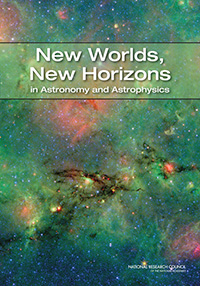Midterm Assessment of the Astro2010 Decadal Survey
Jacqueline Hewitt Massachusetts Institute of Technology
Already five years have passed since the publication of the New Worlds, New Horizons in Astronomy and Astrophysics (NWNH) decadal survey. The scientific, technical, and programmatic landscape has changed in many ways since then, and even at the time of the survey’s deliberations it was recognized that key decision points would be reached mid-decade that would affect the implementation of its priorities. A committee for the Midterm Assessment of the Implementation of the New Worlds New Horizons in Astronomy and Astrophysics Decadal Survey has been formed by the National Academies of Sciences, Engineering, and Medicine with the purpose of surveying the current state of the field and providing guidance to the agencies in the implementation of their astronomy and astrophysics program. The committee has held its first meeting and is moving forward, guided by its Statement of Task:
In the context of funding circumstances that are substantially below those assumed in NWNH, the committee's review will include the following tasks:
1. Describe the most significant scientific discoveries, technical advances, and relevant programmatic changes in astronomy and astrophysics over the years since the publication of the decadal survey;
2. Assess how well the agencies' programs address the strategies, goals, and priorities outlined in the 2010 decadal survey and other relevant NRC reports;
3. Assess the progress toward realizing these strategies, goals, and priorities; and
4. In the context of strategic advice provided for the agencies' programs by federal advisory committees, and in the context of mid-decade contingencies described in the decadal survey, recommend any actions that could be taken to maximize the science return of the agencies' programs.
The review should not revisit or alter the scientific priorities or mission recommendations provided in the decadal survey and related NRC reports but may provide guidance on implementation of the recommended science and activities portfolio and on other potential activities in preparation for the next decadal survey.
The committee's first meeting was held in Washington, DC, on 8-10 October. We heard presentations from the NSF, NASA, DOE, and the White House; from ESA and JAXA; and from several of the activities and projects that were the subject of NWNH recommendations. Our second meeting will be held at the Beckman Center in Irvine, CA, on 12-14 December. December 12 will be devoted to a science symposium organized around the scientific purviews of the five NWNH Science Frontier Panels (SFP). The chairs of the SFPs have been invited to lead the discussions. There will also be an opportunity for public input at the symposium. We intend also to have further presentations from projects at the second meeting. The third and last committee meeting will take place 11-13 January in Washington, DC.
Agendas and other materials for these meetings can be found at the study website.
It is essential that the Midterm Assessment committee gather input from the community, and we are striving to make the process as inclusive as possible. One way to participate is by attending the meeting in December. If you do plan to attend, you must register your attendance using EventBrite. Seating is limited, particularly on 13 December.
The committee will hold a splinter meeting at the January 2016 American Astronomical Society (AAS) meeting in Kissimmee, FL. Please check the AAS Meeting app for the splinter meeting’s date, time, and location. We hope for vigorous community participation at this meeting.
Lastly, if you wish to make a comment, ask a question, or send us information, you can do so at any time by sending an email to [email protected]. Please know that all emails sent to this address must be made publicly available per federal law. Email will be most valuable if it is focused on issues pertinent to the committee's Statement of Task.
Our goal for the Midterm Assessment is to provide guidance to the government that is responsive to recent scientific and technical developments and budgetary realities and that is motivated by the best information on scientific, technical, and programmatic opportunities that the committee can gather at this decadal midpoint. Please get involved and help make the assessment a success and one that you can support.
Sincerely,
Jacqueline N. Hewitt, Chair
For the Midterm Assessment Committee:
Adam S. Burrows, Princeton University
Neil J. Cornish, Montana State University
Andrew W. Howard, University Hawaii-Manoa
Bruce Macintosh, Stanford University
Richard F. Mushotzky, University of Maryland
Angela V. Olinto, University of Chicago
Steven M. Ritz, University of California, Santa Cruz
Alexey Vikhlinin, Harvard-Smithsonian CfA
David H. Weinberg, Ohio State University
Rainer Weiss, Massachusetts Institute of Technology
Eric M. Wilcots, University of Wisconsin
Edward L. Wright, University of California, Los Angeles
A. Thomas Young, Lockheed Martin, retired



